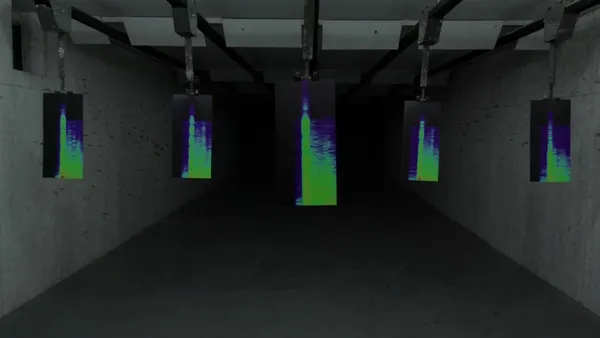Eye For Film >> Movies >> Rubber Coated Steel (2017) Film Review
Rubber Coated Steel
Reviewed by: Andrew Robertson

A documentary entirely about sound, and meaning, and yet almost entirely without sound, and correspondingly full of meaning, Lawrence Abu Hamdan's film is a stunning bit of film-making, the sound of nothing signifying fury.
The film abstracts the presentation of the transcript of a tribunal to a shooting range, the camera unwaveringly tracking a choreography of images hanging from the target-holders, those waveringly tracked back and forth into vision. Sometimes the camera moves, from side to side, from range-booth past padded wall to range booth, and those images on the range move into range, and out, into sight, and out - the shadows at the end conceal much, as does careful framing. We see what the director wants us to see, but what we hear...
On Nakba day of 2014, two Palestinian teens die, shot, fatally. A hearing is conducted - I use that word advisedly in place of tribunal - to determine the cause. Undoubtedly a bullet, perhaps. The outcome of the event is given to us before the transcript. The transcript is, well, read.
This is a film that relies upon subtitles and by implication creates subtext. The transcript is what was heard, written down, but we do not hear the recording - just the transcript on the screen, text, and above it the hum of basement air conditioning, target range mechanisms, the creak of chairs and the rustle of discomfited audience. The text on screen has subtleties - text struck-through but still observable as stricken from the record - to be disregarded, we're instructed, but what has been seen cannot be unseen. The [audience winces at the loud sounds] but it is the same sort of silence as before. The acoustic expert impersonates a bullet, full metal jacket, fired from an M-16 through a rubber bullet adapter. It's apparently a subtle signature, a silence, a suppression, implication expanding as rapidly and as constrained as from the barrel of a gun, these guns, on a day, these days.
From the target rack hang acoustic signatures, bars of sound, colour temperature indicative. There is talk of the sound barrier as the audience sit behind one - so keenly staged and constructed that one assumes that the shadows concealed figures as with bunraku, but the act of staging, or presentation, asks questions of staging and of presentation. Justice must be seen to be done, and all that, but there are further questions raised. "like a [imitates sound]" the subtitles read - the noise it is an impression of also nothing more than words.
The subject is undeniably controversial - even the use of a specific to describe a date has connotations (see, for example, Bridge Across The Wadi) and Rubber Coated Steel has clearly made choices. Objectivity might well be impossible, but the best documentary makes its intent and subject clear, and RCS undeniably, powerfully, achieves.
When it was seen at Glasgow's 2018 Short Film Festival, the structure of its intent caused some difficulty - the usual festival applause confusion is made more likely by the fact that the film relies on text and the credits were spoken. This reversal of expectation is itself indicative, a film that insists on being read. Minimal in form, devastating in impact, echoes and repurcussions left in its wake.
Reviewed on: 17 Mar 2018If you like this, try:
Ears, Nose And ThroatOne Thousand Pictures: RFK's Last Journey
To See if I’m Smiling















